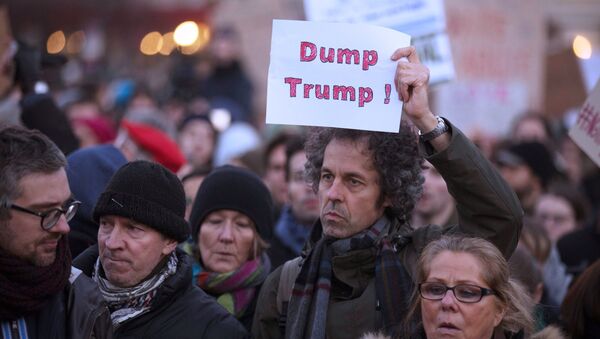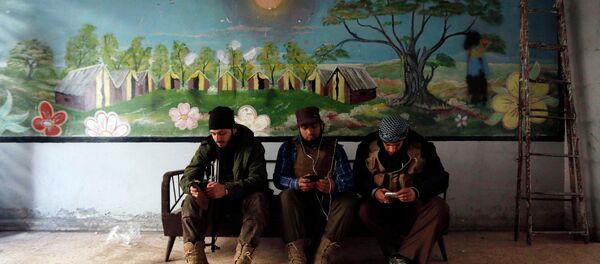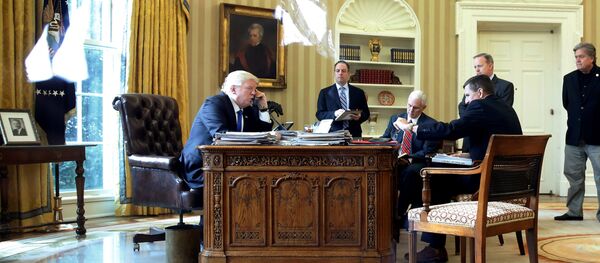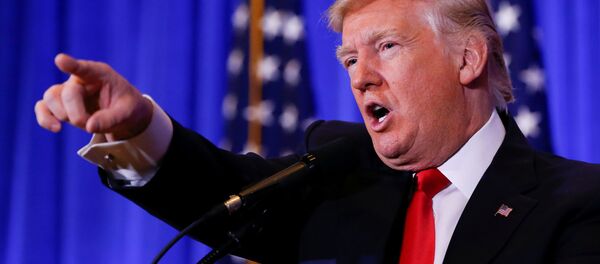Donald Trump's executive order entitled "Protecting the Nation From Foreign Terrorist Entry Into the United States" has generated a firestorm of criticism from Democrats and media pundits. However, analysts believe that there is more to the ongoing protests than meets the eye.
"The Executive Order has been called many things… I have read claims that it is illegal and even unconstitutional and that it provides grounds for Donald Trump's impeachment," Alexander Mercouris, a London-based writer on international affairs and regular contributor to Sputnik, writes in his latest op-ed for TheDuran.com.
Mercouris drew attention to the fact that it is "by no means unheard or even unusual" for countries to tighten up their visa entry rules of to bar entries from particular states or conflict zones.
He recalled that ex-president Barack Obama banned refugee admissions from Iraq for six months in 2011 citing security concerns.
"As for the 50,000 person cap on refugees in the 2017 fiscal year, as I understand it, it is standard US practice to impose such a cap," Mercouris noted.
For his part, David French of National Review magazine also pointed out that the decision to cap refugee admissions at 50,000 per year is neither unusual nor draconian.
"In 2002, the United States admitted only 27,131 refugees. It admitted fewer than 50,000 in 2003, 2006, and 2007," French recalled, "Trump's 50,000 stands roughly in between a typical year of refugee admissions in George W. Bush's two terms and a typical year in Obama's two terms."
Conservative commentator Patrick J. Buchanan echoes French.
In his recent op-ed for the American Conservative he asks why the measure has been dubbed a "Muslim ban" "when not one of the six largest Muslim countries-Indonesia, India, Pakistan, Bangladesh, Egypt, Turkey-was on the list."
There are almost three dozen other Muslim countries which have not been affected by the recent measure, he added.
Meanwhile, critics of Trump's order call attention to the fact that travellers from seven Muslim-majority countries have been barred from entering the US since Friday night.
And, again, it appears that it has nothing to do with either the Trump administration's attitude toward Muslims or the much-discussed "Islamophobia."
Mercouris explained that the list of countries to which the order applies "was previously drawn up by the Obama administration, with the Executive Order simply taking over this list."
"Iran is on the list because the US has long considered Iran to be a country which supports terrorism," the analyst remarked, referring to Tehran's alleged ties with Hamas and Hezbollah.
Furthermore, the analysts referred to the fact that the measure is temporary.
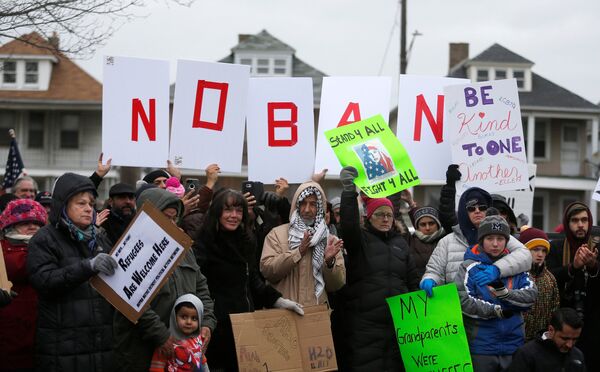
On Wednesday, the Muslim-dominated UAE's Foreign Minister Abdullah bin Zayed bin Sultan Al Nahyan signaled that Abu Dhabi doesn't consider the order as discrimination against Muslims.
"There are attempts to claim that this decision is aimed against a religion, but it is not aimed against a specific religion, this is a temporary decision, it is important to take these points of view into account," Nahyan told journalists.
"Was that weekend-long primal scream really justified?" Buchanan asks rhetorically.
"As of Monday, no one was being detained at a US airport. Yet the shrieking had not stopped," the commentator noted.
Russian lawmaker Alexander Chepa believes that there is more to the fuss over Trump's executive order than meets the eye.
Speaking to RIA Novosti, Chepa emphasized the protests against the order on immigration "resemble orchestrated shows because people did not take to the streets when Obama authorized bombings in Muslim countries."
"I think that protests should have been organized against the bombings in Libya and Iraq. Such actions would be justified. But what we're witnessing now looks rather like an orchestrated show," Chepa said.
Indeed, the Google Trends application indicates an unusual interest toward the "Trump Muslim ban" issue on the Internet, prompting suspicions that the story is being deliberately spun in the media.
Catherine Shakdam, a political analyst, writer and commentator for the Middle East, believes that the "anti-Trump wave of dissent" is by no means "organic."
While "former presidents have done a lot worse than stop people at the border over the years," no one "batted an eyelid," she pointed out.
Indeed, it looks strange that Americans didn't take to the streets over Obama having dropped about 26,171 bombs in seven Muslim-majority countries — Syria, Iraq, Afghanistan, Libya, Yemen, Somalia, Pakistan — in 2016.
Speaking to Radio Sputnik, American peace activist Dr. Phyllis Bennis pointed out that the US' bombing campaign under Obama, the Nobel Peace Prize winner, has actually expanded compared with the George W. Bush era.
Bennis highlighted that instead of containing terrorism, Obama's military policy has sparked more terrorism and violence in the Middle East, Central Asia and North Africa.
The question then arises why Trump's executive action on immigration has stirred up mass protests in the US.
According to Shakdam, the truth of the matter is that the US is facing a "soft coup d'état" carried out by the country's liberal establishment, which suffered a defeat in the US presidential election.
Interestingly enough, immediately after Trump's inauguration a number of petitions calling for his impeachment were launched on different websites. The petitions cite different reasons for Trump's stepping down. One of them, published on the Impeach Trump Now website, has reportedly collected 534,289 signatures.
"Does anyone really want to play [George] Soros and [Hillary] Clinton's games?" Shakdam asks rhetorically.
